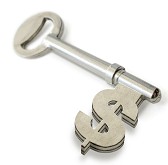Whoever
loves money never has money enough; whoever loves wealth is never satisfied
with his income. This too is meaningless.
-- Ecclesiastes
5:10
Money talks. And often it just says, "Good-bye."
Can you relate to that old saying? According to the Moneyish website, the
average American now faces $37,000 in debt, which doesn't include their
mortgage. About 10% of us owe more than $100,000! And we're also not saving for
the future. The Trading
Economics website reports that our nation's personal saving
rate--the ratio of personal income saved to personal net disposable income
during a set period of time--averaged 8.3% from 1959 until 2017. It reached an
all-time high of 17% in May 1975 and a record low of 1.9% in July 2005. Today,
we're saving about 5.6% of our income.
How can we climb out of this ever-widening money pit? As with
all important things in life, it comes  down to priorities. The average
American is spending 40% of their income on non-essential items like travel,
entertainment and hobbies. Meanwhile, they're holding about two bank-issued
credit cards and carrying a total balance owed of about $5,600.
down to priorities. The average
American is spending 40% of their income on non-essential items like travel,
entertainment and hobbies. Meanwhile, they're holding about two bank-issued
credit cards and carrying a total balance owed of about $5,600.
 down to priorities. The average
American is spending 40% of their income on non-essential items like travel,
entertainment and hobbies. Meanwhile, they're holding about two bank-issued
credit cards and carrying a total balance owed of about $5,600.
down to priorities. The average
American is spending 40% of their income on non-essential items like travel,
entertainment and hobbies. Meanwhile, they're holding about two bank-issued
credit cards and carrying a total balance owed of about $5,600.
Debt is hardly a modern-day issue, and the Bible has plenty to say
about it that's as relevant now as it was centuries ago. First, set aside the
first 10% or more of your income for God's work by giving to the church. This tithe sets our priorities
by putting God first in our lives and focusing our faith on him to meet our
needs.
Need some other debt-busters? Set aside the next 10% or more for
personal savings. Major expenses--like a leaky roof, auto repairs or doctors'
bills--are bound to happen. (And don't forget about retirement!) But if you
save little by little over a long enough period, you'll be pleasantly surprised
at how your money has grown. And it will be there when you need it most.
This all leads to the obvious question: After you've given to God and then to
yourself, how do you handle the rest of your income?
The answer varies by person and his or her unique situation. But
there are some general rules of thumb for being good managers of our resources.
First, we need to discipline
our desires and be satisfied with what God has given us. Buying
the newest, shiniest and most state-of-the-art, must-have item is rarely
necessary if last year's model still works fine. We also need to acknowledge the reality of our
situation. If we're spending more than our income just to keep
up with the neighbors, a reality check can put things into much-needed
perspective. Do you always need that $4 cup of name brand coffee? Finally, draw
up a specific plan by budgeting
your money toward what counts most. (And then stick with it!)
When it comes to money, it really is all about priorities. How we
handle what God gives us is a tangible test of our trust and willingness to
make him our Number One. And if we show him that we can handle just a little while
honoring him in the process, he can use us to advance his Kingdom on Earth by
putting us in charge of much more than we can ever imagine.

No comments:
Post a Comment